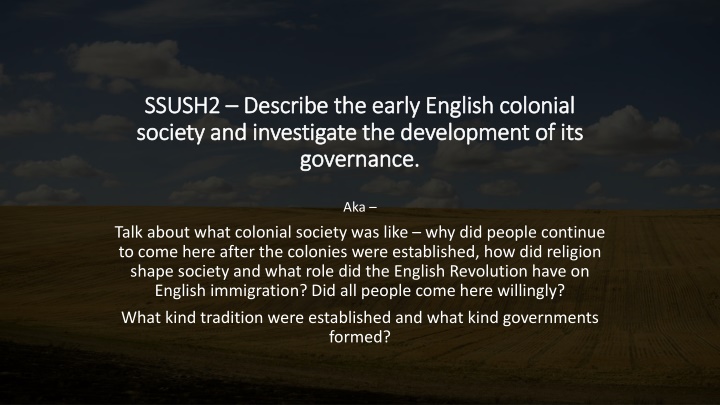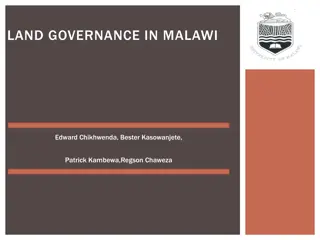Early English Colonial Society and Governance
English colonial society in North America was diverse, attracting people for economic opportunity, religious freedom, and self-government. While some came willingly, others like Africans were forced into slave labor. Different regions attracted different groups, shaping society. Education was valued in New England, while the Southern Colonies drew young English men seeking financial gain.
Download Presentation

Please find below an Image/Link to download the presentation.
The content on the website is provided AS IS for your information and personal use only. It may not be sold, licensed, or shared on other websites without obtaining consent from the author.If you encounter any issues during the download, it is possible that the publisher has removed the file from their server.
You are allowed to download the files provided on this website for personal or commercial use, subject to the condition that they are used lawfully. All files are the property of their respective owners.
The content on the website is provided AS IS for your information and personal use only. It may not be sold, licensed, or shared on other websites without obtaining consent from the author.
E N D
Presentation Transcript
SSUSH2 SSUSH2 Describe the early English colonial Describe the early English colonial society and investigate the development of its society and investigate the development of its governance. governance. Aka Talk about what colonial society was like why did people continue to come here after the colonies were established, how did religion shape society and what role did the English Revolution have on English immigration? Did all people come here willingly? What kind tradition were established and what kind governments formed?
Early Colonial Society English colonial society was made up of diverse ethnic groups and individuals who arrived in North America with different goals and under different circumstances. The colonies grew quickly once the initial challenges of settlement were overcome.
Reason To Continue Coming Economic opportunity and the social mobility that came along with financial gain attracted colonists from many different locations to make the journey to America. Although economic opportunity, religious freedom, and self-government came to be colonial traditions embraced by the colonists, not all people came to the English colonies by choice. Africans, brought against their will to America on the Middle Passage, were forced into permanent slave labor arrangements and did not benefit from the emerging successes of colonial society.
What Attracted People to the Southern Colonies? The Southern Colonies tended to attract young English men seeking financial gain and the New England Colonies, with their religious foundations, tended to attract more English families for settlement. Women in the colonies, and in England, were primarily viewed as inferior to men and possessed few rights.
. What Attracted People What Attracted People to the Middle Colonies? to the Middle Colonies? The Mid-Atlantic Colonies had more religious and ethic diversity than the other regions during the early colonial period due to England s acquisition of the previously settled territory from other European countries (Discussed in SSUSH1d). After 1660, with the Restoration of the Monarchy, England s economy improved. The more stable conditions led to fewer Englishmen immigrating to America. However, other European countries began to experience greater political and economic unrest, which resulted in heightened Irish, Scottish, and German immigration to the English American colonies.
Education Attracted Families Education Attracted Families to the New England to the New England? Education was emphasized differently in the colonial regions. The New England Colonies tended to support the establishment of schools within their townships. The population of New England Colonies was primarily concentrated into towns, making schools more feasible given the close proximity of students. The New England religious foundation also fostered literacy in order to read the Bible.
Education in the South The Southern colonies, with their strong emphasis on large-scale agriculture, were not conducive for formal schools. Fewer towns and cities formed in the Southern Colonies due to landowners being more spread out for farming. There were few locations where a schoolhouse would have been practical. Instead, wealthy planters in the Southern Colonies who wanted to educate their children relied on privately hired tutors or sent their children to boarding schools in England
Religion in the Colonies Religion in the colonies also varied by region. New England s Puritan roots formed the foundation for all aspects of society in the region. As was true concerning education, the scarcity of towns in the Southern Colonies, made formal churches less practical. The steady growth of the Enlightenment in the eighteenth century threatened religion s influence, whether formal or informal, on colonial society.
What is the Great Awakening? The Great Awakening was the religious response to the Enlightenment and ---- emphasized more individual relationships with God through the messages of highly engaging revivalist ministers who traveled all thirteen colonies. The religious awakening of the early eighteenth century fostered an independence among colonists that would later contribute to the independent political thought of the revolutionary period.
SELF-GOVERNANCE in the Colonies The colonies developed systems of local self-government during the early colonial period stretching from the first colony in Jamestown in 1607 to the French and Indian Wars in 1763. Most colonies had local assemblies to legislate on local matters while still met. remaining loyal to the king in England Voter eligibility, even where land ownership was required, was much greater in the colonies than in England. Land was scarce and expensive in England, while more abundant and cheaper in the colonies. Thus, a more representative local government in the colonies existed during the early colonial period. The English Crown had limited involvement in local government matters in the colonies as long as the mercantilist demand for resources was being
How did Englands role in the Colonies change after the French and Indian War? This system of salutary neglect continued until after the French and Indian War in 1763, at which time England faced mounting debt and began to seek greater local control over the colonies. Having the long-standing tradition of colonial self-government made the Crown s new, stricter policies and taxes less tolerable. https://historyofmassachusetts.org/ what-was-the-british-policy-of- salutary-neglect/























